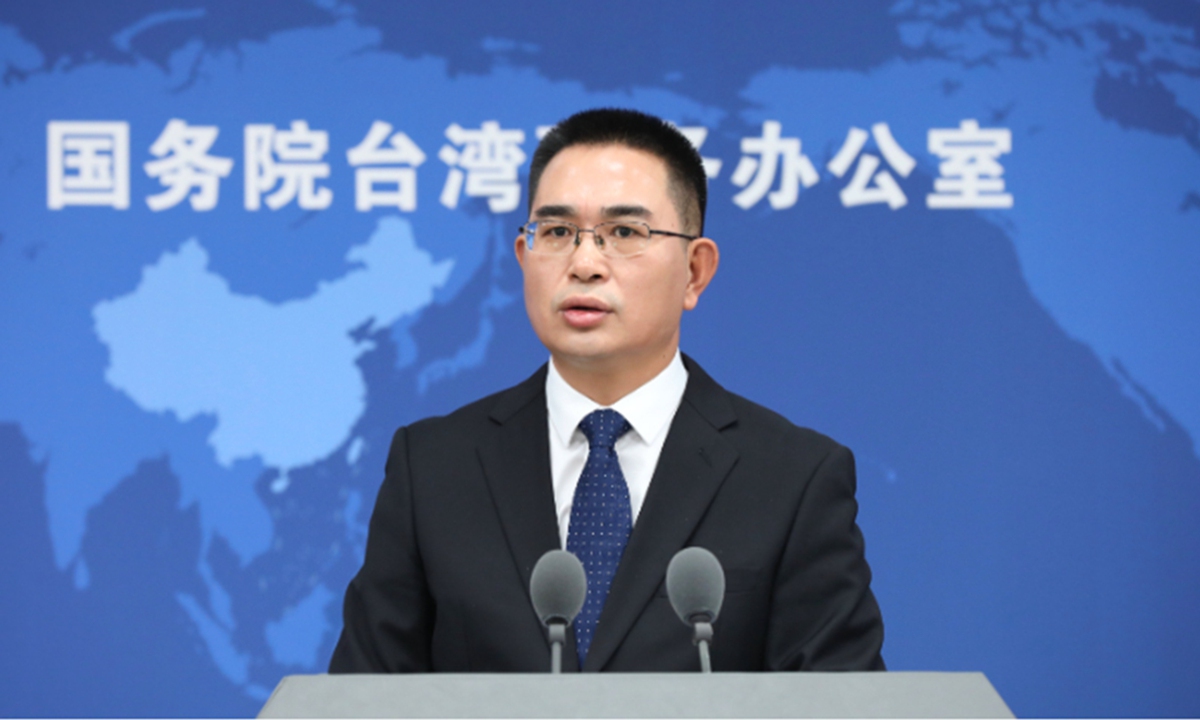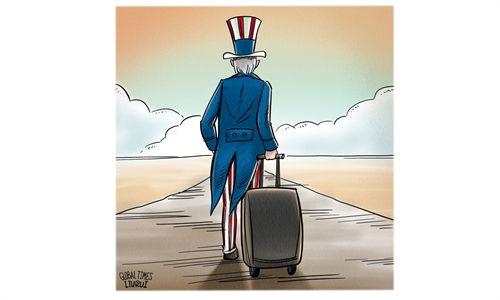Taiwan authorities’ hype of mainland’s M503 flight route change shows their guilty conscience

Chen Binhua, a spokesperson for the State Council's Taiwan Affairs Office Photo:VCG
The Chinese mainland has enough and legitimate reasons for changing the M503 flight route, which lies west of the so-called median line of the Taiwan Straits. But such a change is used by the Democratic Progressive Party (DPP) authorities on the island of Taiwan to slander the mainland as "pressuring Taiwan," so as to shape an "aggressive image" of the mainland and a "threat from the mainland." This is both hysterical and naïve. The reason why Taiwan authorities have extreme anxiety about the so-called suppression from the mainland is that they are well aware that they are moving against the general trend of the time.On Tuesday, Taiwan's civil aviation authority protested the Chinese mainland's adjustment of the M503 flight route. Some "experts" on the island even said it is an attempt to "encroach on the formerly tacit boundary" and to "put more pressure on Taiwan as it monitors airspace."
Yet, the route adjustment is a professional issue in terms of aviation, not a political one. The M503 flight route is close to the mainland side and is a civil aviation route in the Shanghai Flight Information Region. Thus, the protest by the Taiwan authorities is unjustified from any point of view. Moreover, there is no such thing as the so-called median line, let alone the encroachment or breaking of it.
According to the State Council's Taiwan Affairs Office on Tuesday, it is a measure to "ease traffic congestion and ensure aviation safety," and there is no need to consult with the Taiwan side at all. What's more, the adjustment of flights will also help improve the operation of cross-Strait flights and better serve personnel travel between the two sides of the Straits, which is in line with the common interests of compatriots on both the mainland and Taiwan.
Since 2015, some malicious political forces and social groups on the island of Taiwan have frequently used the M503 flight course to hype up issues on cross-Straits relations. In 2018, the DPP authorities refused to approve the mainland's applications of 176 flights flying the M503 course during the Spring Festival holiday on the grounds of "potential flight safety concerns."
The DPP's obstruction has always been based on political interests only, with no regard for the demands of Taiwan people and international travelers. It is the DPP authorities who have undermined the common political foundation of both sides of the Straits, jeopardized the peaceful development, and impaired the common interests of people on the mainland and the island.
The Taiwan authorities have now become used to labeling everything the mainland does in the Taiwan Straits as "repression" or "malice." The island's "mainland affairs council" claimed that the mainland is trying to "package" civil aviation for political or military considerations. The Taiwan authorities are concerned that the M503 flight route may provide cover for the mainland's military attack on Taiwan in the event of a cross-Straits war. The root cause of this hysteria is that the DPP authorities are unwilling to give up their ambitions for "Taiwan independence," and thus have a guilty conscience, fearing that one day military punishment from the mainland will happen.
Instead of making a sober political judgment on the situation in the Taiwan Straits, the Taiwan authorities are splitting hairs over technical speculation about the change of the M503 flight route. It is putting the cart before the horse. For the DPP, recognizing the 1992 Consensus, abandoning the pursuit of "Taiwan independence," and improving cross-Straits relations are the most fundamental solutions to relieve all their pressure.
Only by adhering to the 1992 Consensus will peace across the Taiwan Straits become unbreakable. Taiwan's security must fundamentally be consolidated through political means, and if the two sides of the Straits come to a point where they must put an end to the Taiwan question, the existence of the M503 flight route will not have an impact on the mainland's choice.
The DPP authorities claim that the mainland's adjustment of M503 is to "change the status quo," but it is the DPP, instigated by the US, that has really changed the status quo. The actions taken by the US before and after the recent regional leader election in Taiwan fully demonstrated its connivance and support for the DPP and its provocative stance against the Chinese mainland. Tsai Ing-wen, in her speech on New Year's Day 2024, stigmatized the 1992 Consensus as a "tremendous risk" for Taiwan, showing that the DPP authorities have pushed the island to the forefront of "Taiwan independence."
Tong Liqun, a research fellow at the Institute for Taiwan, Hong Kong and Macao Studies of the Shanghai Institutes for International Studies, believes that the purpose of the DPP's malicious speculations against the mainland's adjustment is to show its stance to the US. The DPP politicians are creating tension in the Taiwan Straits and a worse impression among the Taiwan residents toward the mainland, pushing for the "decoupling" with the mainland and creating a favorable public opinion for their path to "Taiwan independence." Meanwhile, they are projecting an image that they are not afraid of pressure from the mainland, thus further seeking so-called independence with the backing of the US, said Tong.
However, the Taiwan authorities should realize that the US is only using Taiwan as a counterweight to the mainland, and that "Taiwan independence" is ultimately only a delusional dream of those secessionists, the Chinese scholar said.

